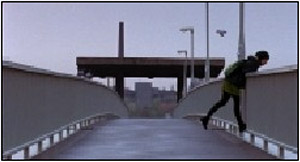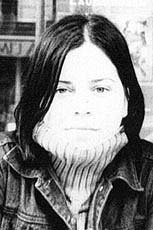Fresh Air: A Breath of New Hungarian Cinema

Fresh Air (Friss Levegö) was one of the films in competition at the recent Kiev Film Festival of the 36th Molodist that took place towards the end of October. It is the first feature by Ágnes Kocsis and has already won her awards to underline the acclaim she has received. It is another film to emerge out of Hungary - a nation that seems to be stepping very much into the limelight of European, indeed, world cinema again. Confirmation of this is also seen in films like Nimród Antal’s Control, Attila Janish’s After the Day Before and Taxidermia by György Pálfi, not to mention that Bela Tarr is working on his latest film.
The premise of Fresh Air is a council estate in the suburbs of a large city (Budapest? It’s the director’s birthplace) where Viola (Julia Nyako) and her daughter Angela (Izabella Hegyi) are living. Both of them are in a crisis of their own: Viola is approaching middle-age and would like to have a man in her life and Angela is a bored, moody 17 year-old who is studying to be a fashion designer, but doesn’t have a boyfriend. They take out their frustrations by ignoring one another and do not communicate apart from when they join on the couch to watch their favourite soap opera. Their good, almost fanatical, habits are keeping the flat clean, something Viola probably learnt in her violation at working as a bathroom attendant, a job which carries a social stigma. Viola often wears red and that is also the colour of the walls in the bathroom she is seen keeping cheerful. By contrast, Angela wears and seems attracted by the colour green, thus conveying their emotional detachment. It’s also arguably a nod to the idea that student films are full of symbolism and that Kocsis has carried this over into her first feature.
We are often surprised at where the story is taking us and therefore traditional narrative structure is not compromised. This becomes clear in the opening sequence where Viola is at a ballroom dance class, one of her failed attempts at meeting someone special. One of the other students walks her home and then admits he wants to be her full-time companion. She spurns his advances but, instead of the dancing class playing a significant role, we never see this or the man in the film again. Also, although there has been a somewhat precarious stability throughout, the equilibrium is not broken until near the film’s end. When this happens, it is dramatic but in a plausible way that still quadrates with the consistent mood and atmosphere. However, it is this wait that builds tension because up to this moment we have become very engaged in the lives of the mother and daughter in their humdrum existence on the council estate.
 Director Ágnes Kocsis
Director Ágnes Kocsis
Ágnes Kocsis admits an influence from directors ranging from Godard, Fellini, Antonioni and Truffaut to Bunuel and Olmi. However, it’s difficult to find direct influences from those directors here. The long-shots with static camerawork more conjure up Jim Jarmusch’s first work Stranger than Paradise, but with a contemporary European realism thrown in (oddly enough Angela is reminiscent of the Eva character in Jarmusch’s film who was played by another Hungarian actor Eszter Balint). What the director does share with Jim Jarmusch is an unequivocal sense of humour despite the often desolate desperation that Angela and particularly Viola find themselves in. Angela has a real sense of fun at times which has conceivably been passed down from her mother even though that’s not so evident in the film’s duration.
We find ultimately, Fresh Air is a film about emotions, communication and loneliness made with a directorial style that is indirectly acknowledging of influences yet neoteric and engaging. Taking the notion that life has no plot, it’s almost akin to watching a fly on the wall documentary about two people over a period of time until something interesting happens that will alter their lives in a hopefully positive way. In this instance, it is not the happiest of denouements, yet still a satisfactory one, not only for the mother and daughter but what the audience would have hoped for as well. If Ágnes Kocsis continues making films as good as this, Bela Tarr won’t be the only bright light of contemporary Hungarian cinema.

Fresh Air (Friss Levegö) was one of the films in competition at the recent Kiev Film Festival of the 36th Molodist that took place towards the end of October. It is the first feature by Ágnes Kocsis and has already won her awards to underline the acclaim she has received. It is another film to emerge out of Hungary - a nation that seems to be stepping very much into the limelight of European, indeed, world cinema again. Confirmation of this is also seen in films like Nimród Antal’s Control, Attila Janish’s After the Day Before and Taxidermia by György Pálfi, not to mention that Bela Tarr is working on his latest film.
The premise of Fresh Air is a council estate in the suburbs of a large city (Budapest? It’s the director’s birthplace) where Viola (Julia Nyako) and her daughter Angela (Izabella Hegyi) are living. Both of them are in a crisis of their own: Viola is approaching middle-age and would like to have a man in her life and Angela is a bored, moody 17 year-old who is studying to be a fashion designer, but doesn’t have a boyfriend. They take out their frustrations by ignoring one another and do not communicate apart from when they join on the couch to watch their favourite soap opera. Their good, almost fanatical, habits are keeping the flat clean, something Viola probably learnt in her violation at working as a bathroom attendant, a job which carries a social stigma. Viola often wears red and that is also the colour of the walls in the bathroom she is seen keeping cheerful. By contrast, Angela wears and seems attracted by the colour green, thus conveying their emotional detachment. It’s also arguably a nod to the idea that student films are full of symbolism and that Kocsis has carried this over into her first feature.
We are often surprised at where the story is taking us and therefore traditional narrative structure is not compromised. This becomes clear in the opening sequence where Viola is at a ballroom dance class, one of her failed attempts at meeting someone special. One of the other students walks her home and then admits he wants to be her full-time companion. She spurns his advances but, instead of the dancing class playing a significant role, we never see this or the man in the film again. Also, although there has been a somewhat precarious stability throughout, the equilibrium is not broken until near the film’s end. When this happens, it is dramatic but in a plausible way that still quadrates with the consistent mood and atmosphere. However, it is this wait that builds tension because up to this moment we have become very engaged in the lives of the mother and daughter in their humdrum existence on the council estate.
 Director Ágnes Kocsis
Director Ágnes KocsisÁgnes Kocsis admits an influence from directors ranging from Godard, Fellini, Antonioni and Truffaut to Bunuel and Olmi. However, it’s difficult to find direct influences from those directors here. The long-shots with static camerawork more conjure up Jim Jarmusch’s first work Stranger than Paradise, but with a contemporary European realism thrown in (oddly enough Angela is reminiscent of the Eva character in Jarmusch’s film who was played by another Hungarian actor Eszter Balint). What the director does share with Jim Jarmusch is an unequivocal sense of humour despite the often desolate desperation that Angela and particularly Viola find themselves in. Angela has a real sense of fun at times which has conceivably been passed down from her mother even though that’s not so evident in the film’s duration.
We find ultimately, Fresh Air is a film about emotions, communication and loneliness made with a directorial style that is indirectly acknowledging of influences yet neoteric and engaging. Taking the notion that life has no plot, it’s almost akin to watching a fly on the wall documentary about two people over a period of time until something interesting happens that will alter their lives in a hopefully positive way. In this instance, it is not the happiest of denouements, yet still a satisfactory one, not only for the mother and daughter but what the audience would have hoped for as well. If Ágnes Kocsis continues making films as good as this, Bela Tarr won’t be the only bright light of contemporary Hungarian cinema.

0 Comments:
Post a Comment
<< Home